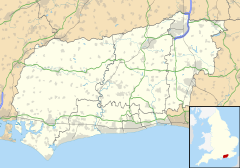Selsey
| Selsey | |
|---|---|
 Aerial view |
|
| Selsey shown within West Sussex | |
| Area | 12.28 km2 (4.74 sq mi) |
| Population | 10,737. 2011 Census |
| • Density | 804/km2 (2,080/sq mi) |
| OS grid reference | SZ854935 |
| • London | 60 miles (97 km) NNE |
| Civil parish |
|
| District | |
| Shire county | |
| Region | |
| Country | England |
| Sovereign state | United Kingdom |
| Post town | CHICHESTER |
| Postcode district | PO20 |
| Dialling code | 01243 |
| Police | Sussex |
| Fire | West Sussex |
| Ambulance | South East Coast |
| EU Parliament | South East England |
| UK Parliament | |
| Website | http://www.selseytowncouncil.gov.uk/ |
Selsey is a seaside town and civil parish, about eight miles (12 km) south of Chichester, in the Chichester District of West Sussex, within the historic county of Sussex, England. Selsey lies at the southernmost point of the Manhood Peninsula, almost cut off from mainland Sussex by the sea. It is bounded to the west by Bracklesham Bay, to the north by Broad Rife (rife being the local word for stream or creek), to the east by Pagham Harbour and terminates in the south at Selsey Bill. There are significant rock formations beneath the sea off both of its coasts, named the Owers rocks and Mixon rocks. Coastal erosion has been an ever-present problem for Selsey.
There is only one road (the B2145) in and out of the town, which at a point known as "the ferry", crosses a bridge over the water inlet at Pagham Harbour. At one time Selsey was inaccessible at flood tide, and a boat was stationed at the ferry to take horses and passengers to and from Sidlesham.
According to Bede the name Selsey is derived from the Saxon Seals-ey and can be interpreted as the Isle of Sea Calves (sea calves are better known as seals).
Edward Heron-Allen identified at least twenty different spellings of the place that we now know today as Selsey.
A selection of versions as identified by Heron-Allen are:
The Crown Inn
The earliest evidence of human habitation in the Selsey area goes back to the stone age. Various stone implements have been found which date to the Palaeolithic period. People have been living in the area ever since.
It is believed that, in the Iron Age, the Atrebates (one of the Belgae tribes) built a city at Selsey, similar in status to the pre-Roman urban centre ( oppidum) at Hengistbury Head near Christchurch. So far there is no archaeological evidence to confirm this, although some have speculated that the old city that Camden refers to is, indeed the old Belgae settlement and was located at the Mixon rocks, now south of Selsey Bill.
...
Wikipedia

